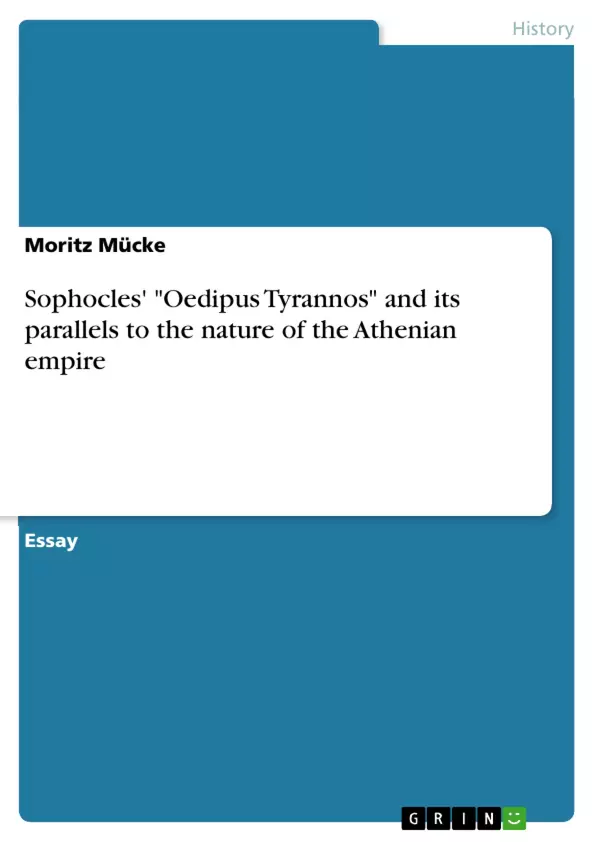Sophocles' "Oedipus Tyrannos" was produced in Athens during the Peloponnesian War, likely in the mid-420s, and represented the famous Athenian playwright's own take on the then-popular myth of the Theban king Oedipus and his unintentional parricide and incestuous marriage with his own mother, fulfilling the very prophecy he was trying to avoid. The play contains characters, references, and details that to a significant extent reflect contemporary imperial Athens and its customs. The character of king Oedipus himself can largely be read as an analogy to the habits and tendencies of the Athenians as well as to public life in their commonwealth. Apart from the depiction of the plague, the play also contains parallels to the nature of the Athenian empire in general and the Mytilenean debate in particular.
Table of Contents
- Sophocles' Oedipus and Athens
- The Plague and Thucydides
- Oedipus and Athenian Character
- The Athenian Empire in Oedipus Tyrannos
- Mytilene and Creon
- Conclusion
Objectives and Key Themes
This essay explores the connections between Sophocles' Oedipus Tyrannos and contemporary Athenian culture, particularly during the Peloponnesian War. It examines how elements of the play, such as the plague at Thebes, the character of Oedipus, and the themes of power and governance, reflect the realities of Athenian society.
- The influence of Thucydides' account of the plague on Sophocles' portrayal of the plague in Thebes
- The similarities between the character of Oedipus and the Athenian people, particularly in terms of their inquisitive nature and propensity for action
- The parallels between the Athenian empire and Oedipus' rule in Thebes, emphasizing their shared belief in their right to power and the justifications they offer for their dominance
- The resonance of the Mytilenean debate in Oedipus' interactions with Creon, specifically in terms of the Athenians' approach to rebellion and the importance of oaths and alliances
- The overall significance of understanding Sophocles' Oedipus Tyrannos within the context of Athenian culture and history
Chapter Summaries
This essay begins by exploring the striking parallels between Sophocles' portrayal of the plague at Thebes and Thucydides' historical account of the plague at Athens. It draws specific comparisons between the descriptions of the plague's impact on the city and its inhabitants, highlighting the similarities in imagery and themes.
The second chapter examines the relationship between Oedipus' character and the perceived character of the Athenians. It highlights the shared traits of inquisitiveness, impulsiveness, and a strong tendency for action, arguing that Oedipus can be seen as an embodiment of Athenian characteristics.
Moving on to the Athenian empire, the essay analyzes the parallels between Oedipus' rule and the Athenian justification for their imperial power. The essay connects Oedipus' rise to power through the defeat of the Sphinx with the Athenian victory over the Persians and explores the justifications they each offer for their leadership.
Finally, the essay explores the connection between the Mytilenean debate and Oedipus' interactions with Creon. It analyzes the Athenian approach to rebellion, emphasizing the significance of oaths and alliances within the Delian League, and connects this to the dynamic between Oedipus and Creon.
Keywords
The essay focuses on the following key terms and concepts: Sophocles' Oedipus Tyrannos, Athenian culture, Thucydides, the Peloponnesian War, the plague, Athenian character, Athenian empire, Mytilenean debate, power, governance, rebellion, oaths, alliances, and the Western canon.
- Citation du texte
- Moritz Mücke (Auteur), 2014, Sophocles' "Oedipus Tyrannos" and its parallels to the nature of the Athenian empire, Munich, GRIN Verlag, https://www.grin.com/document/286183



